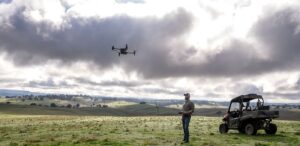Agrifoodtech is tackling some of the most complex and pressing problems facing our food system. But not every new innovation has to land on the bleeding edge for users to find value.
“Aquaponic farm data has traditionally been scattered information, on paper logs or confusing spreadsheets. We’ve made it easier to monitor in a very intuitive and efficient way,” Daniel Robards, co-founder and chief business development officer at Aquaponics AI, tells AFN.
Aquaponics refers to systems that combine fish, crustacean, or mollusc farming with plant cultivation. Animal excretions in the water can be used as nutrition for plants, which thereby remove the potential toxins from the water that can be recirculated back to the animals.
“Because data is useless if you cannot visualize and understand it, our platform takes unstructured data and translates it into digestible insights so growers can make better decisions on and off the field,” Robards adds.
Aquaponics AI launched in January this year with a desktop cloud-based software offering. It added a mobile app in July.
Based out of Amman, Jordan, the startup provides libraries for fish, plants, and diseases as well as a platform for managing aquaponic systems. The goal is for growers to have data-driven insights and also develop their skills with dedicated crop and disease libraries organized in one place.
Robards is also the co-owner of a company called Tulua — alongside Aquaponics AI co-founder Jonathan Reyes — that is aiming to “liberate communities” through aquaponics.
“Our target demographic is worldwide. However, because we live and work in the Middle East, we are connected with growers here,” he explains.
“We see a massive need for equal access and empowerment of local communities” and individuals who will “be the next generational farmer[s] in the region.”
Read on to learn more about Aquaponics AI’s startup journey and how it’s hoping to empower the Middle East.
What is the aquaponics scene like in the Middle East?
The indoor ag scene in Jordan is very limited at the moment. There are only a handful of CEA [controlled environment agriculture] operations and at this point, no significant investment has been made in the indoor ag scene. It’s a matter of time and we will begin to see some developments, but economically Jordan, Egypt, Syria, and Lebanon are a very different scene than the [Persian] Gulf countries. The UAE looks to be on pace to develop a remarkable agtech ecosystem.
As one of the most water-scarce regions on Earth, the Middle East faces unique challenges in agriculture. Water alone is a big factor in how we see agrifoodtech impacting Middle Eastern agriculture. The median age in Jordan is 24 years old, with a similar median age in the region. What thrills us is there is a large young population of intelligent, tech-savvy, and innovative people. The Middle East historically has adapted and innovated through wars, political unrest, and environmental challenges. It’s going to be exciting to see the next few years here in the region.
Who is your target customer?
We are partnering with passionate aquaponic trainers, STEM educators, commercial farmers, and research institutions globally to help them supercharge aquaponic growth and expansion. Our target customer comes from these 4 demographics.
As an impact-oriented agtech service we are in the middle of the thriving membership economy. We know we can’t address the issues facing aquaponics on our own. Therefore, our customers invest in the movement and tap into the value of a long-term, formal relationship through our SaaS. We promise to provide a data-driven solution to their pain points and continually innovating our software in exchange for their membership and contribution to doing awesome things with Aquaponics for people and the planet. We are connecting researchers to the general public and commercial farms to the isolated grower. Aquaponics AI is powering a global community of aquaponic growers and unlocking the potential in next-gen farming worldwide.
Have you raised funding externally, or are you in the process of doing so?
We are self-funded at the moment and building an exceptional user experience and platform before we step into serious investor conversations. Jon [Reyes, co-founder] and I come from more than 20 years of collective experience living internationally. We are interested in waiting for the right impact investors who are fully aligned with the social and human capital impact vision of Aquaponics AI in its efforts to end world hunger, liberate communities, and power the bright future of aquaponics.
What has been the most surprising aspect of your startup journey so far?
We are growers ourselves. Aquaponics AI wasn’t built in a Silicon Valley think tank – it was birthed out of countless hours of struggling through research, experimentation with our own farms, talking with growers, and collaborating with industry experts.
I think what has surprised me the most is how ready and willing aquaponic practitioners are to partner and contribute together in this specific sector. We’ve experienced over and over the kindness and genuine willingness to talk and help resource our vision. The aquaponic community is a unique group as all of us have personally experienced the potential for global impact. We understand that in order for aquaponics to be a competitor in the future of sustainable agriculture we need to be working together.
Can you share details about some of the challenges that you’ve faced, and how you overcame them?
We launched our product weeks before an unforeseen global pandemic. Therefore, we are building our community and user base at a time where many of our users are essential workers as food providers. Our growers are working extremely hard to manage new norms of food safety, distribution chains, and getting their produce to market in the midst of this challenge. So we caught our users at a really busy, stressful, and difficult time for them.
Despite this challenge, we keep moving forward and connecting with growers, educators, and aquaponic system providers and sharing our solution. Covid-19 has only increased the pace at which aquaponics will play a critical role in the future of sustainable agriculture. This will drive innovation, especially in the agritech sector, so we are excited to ride the momentum and support a global community of growers.
What advice would you give to other startups?
I am continually reminded that Uber, Airbnb, and other distributive businesses were birthed in the middle of economically challenging times. It’s not easy, but despite the challenges 2020 has brought, there is such an underlying momentum of hope and change. The global food value chain needs innovation, disruption, decentralization, and creativity. We couldn’t be more thrilled that our business is being launched in a time where we will all look back and see how humans innovated for a better future because of the challenges a pandemic brought.
So I advise other startups to find a community of passionate and positive people. There will be different outcomes a year or so from now because of the people we’ve surrounded ourselves with. I’m lucky to be around people currently who are seeing the potential [of aquaponics.]





